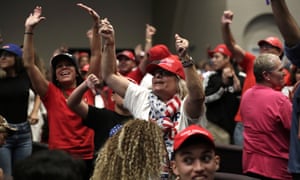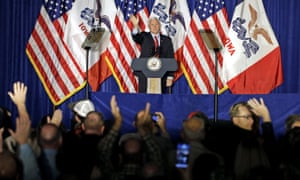Donald Trump
Trump has handed his ultra-loyal evangelical base policy victories and in return they turn a blind eye to his scandals

Photograph: Lynne Sladky/AP
Joanne Craig, a lifelong evangelical Republican and resident of Sioux City, Iowa, couldn’t be more satisfied with the first three years of Donald Trump’s presidency.
Donning a large, blue “Christians for Trump” button on a blue pantsuit, the 80-year-old Craig emerged from the Country Celebrations Event Center in this small Iowa city satisfied to have heard Mike Pence and a cadre of Baptist pastors coo about the president’s policy victories.
“I couldn’t be more satisfied with either one, Trump or the vice-president,” said Craig, who says her top priority is revoking the supreme court’s decision Roe v Wade which legalized abortion in the US. “What he’s done with the supreme court, who he’s chosen for vice-president. It’s all great.”
While much of Iowa and the eyes of the world are focused on the Democratic race in the state, which votes on Monday to pick an opponent to try and unseat Trump, Trump and his allies have also visited the state – with Pence focusing on Trump’s core and ultra-loyal evangelical base.
Q&AWhat are the Iowa caucuses?

On 3 February, the midwestern state of Iowa will kick off the long process of choosing the Democratic party’s presidential nominee, who will take on Donald Trump in the US election in November.
Most US states hold primary elections, in which voters go to a polling place, mail in their ballots or otherwise vote remotely. But a handful of states hold caucuses – complicated, hours-long meetings with multiple rounds of balloting until one candidate emerges as victor.
Both Democratic and Republican caucuses will take place on 3 February. But because Trump doesn’t face any serious Republican challengers, all eyes will be on the Democratic contest.
Put simply, Iowans aged 18 and over who are registered with a party will gather in caucus sites (school gyms, churches, community halls) in their designated precinct, and vote with their feet by splitting into groups based on their preferred candidate.
Once voting is over at a caucus site, the support for viable candidates (those with more than 15% of the votes) is translated into a number of “state delegate equivalents”. That result is used to calculate the number of national delegates each candidate receives. National delegates eventually choose the nominee at the Democratic convention in July.
On the night, the candidate with the most SDEs is considered the winner.
Pence’s hour-long event catered to the likes of Craig and others like her in the estimated 400-member crowd who were seated on a hardwood floor in the building. He was preceded by a prayer delivered by Robert Jeffries, a Baptist preacher of a 14,000 member congregation in Dallas, Texas, that was as much a message to God as it was a diatribe against Democrats “on the wrong side of every issue” relating to religious conservatives.
He excoriated Democratic presidential candidates on their views on Israel, religious liberties and protections for “the unborn”.
“You can say without any exaggeration president Trump is the most pro-Israel, pro-life president in history,” Jeffries said to thunderous applause before his introduction of Iowa governor Kim Reynolds, who touted her state’s recent signing of a strict anti-abortion bill.
Reynolds described the devoutly religious Pence as someone who “puts faith and values first”. Pence was quick to echo her remarks in his speech. “I am a Christian, I am a conservative and I am a Republican, in that order,” he opened.
He said above all, he couldn’t be more proud to stand with a president who stands for the sanctity of human life. He noted Trump’s recent attendance at the March for Life; he was the first president to do so in person. He said he was the tie-breaking vote in a Senate resolution to defund Planned Parenthood, which generated the most thunderous applause of his morning speech.

Pence closed with a prayer, asking crowd members, who he says are a “great new coalition” to pray for unity in the country and what he says is the continued success of the Trump economy.
“I would encourage you to have that other kind of faith. If you are inclined, to bow the head and bend the knee over the next year to this election, I would encourage you to do it … Let’s pray for America and pray for all the American people,” he said. “Pray for America, it’ll make a difference.”
Not once was Trump’s own religious faith mentioned, though he was mentioned as a champion for the religious right through his policy victories. That was a phenomenon that seemed to sum up Trump’s strange relationship with evangelicals: he has returned their support with policy victories for them. In turn they often seem to turn a blind eye to his scandal ridden presidency, accusations of rape, sexual assault and harassment, three marriages and paying off a pornography actor whom claims she had an affair with him.
Some of that blindness seems willful, seeing in Pence as the genuine religious force in the administration.
“Trump’s a good guy who’s backed by a guy with a solid religious foundation,” said Trish Murphy, a Sioux Falls resident who was bused into the venue that morning.
When asked whether Trump himself was a man of faith, she paused and said she thought he was.
Craig was quicker to answer that question.
“Absolutely, he is,” she said. “He just expresses it differently than me.”
She said she weighs his policy choices much heavier than Trump’s individual character. When asked about the scandals surrounding Trump’s behavior, specifically his alleged affair with Stormy Daniels, Craig said: “Everybody’s made mistakes.”
“All those Democrats going down the line have their problems, too,” she said. “Just everybody wants to focus on the president.”
Brad Best, a political science professor longtime observer of the Iowa Caucuses, told The Guardian that evangelicals are the most fervent political cohort in the entire state. Religiosity that’s reinforced every week in a sermon or through a community is difficult to break when policy choices are satisfied, he said.
“To say the president and evangelicals are strange bedfellows is an understatement,” Best said after the event. “Through very much a siege mentality that’s expressed in their rhetoric, and they’ve been handed policy defeats to that end for decades. Hence, they’re well-tuned to issues and willing to take a vessel that’s willing to court their wants.”



